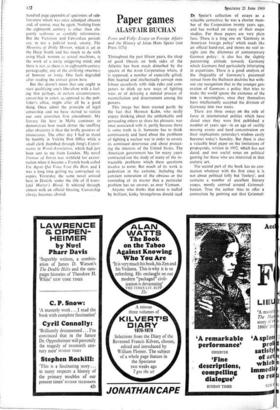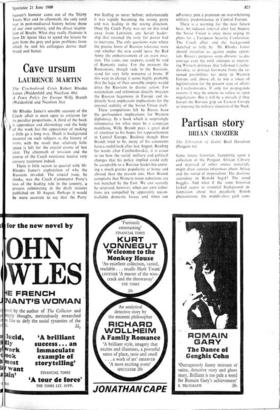Paper games
ALASTAIR BUCHAN
Throughout the past fifteen years, the sleep of good liberals on both sides of the Atlantic has been much disturbed by the spectre of the RAND Corporation where, it is supposed, a number of especially gifted, flint hearted and intellectually corrupt men labour ceaselessly with slide rules and com- puters to think up new ways of fighting wars or of delaying a natural process of reconciliation and disarmament among the powers.
This image has been created partly by the fact that Herman Kahn, who really enjoys thinking about the unthinkable and persuading others to share his pleasure, was once associated with it, partly because there is some truth in it. Someone has to think continuously and hard about the problems of fighting a nuclear war in order to ensure its continued deterrence and about protect- ing the interests of the United States. The American government has for many years contracted out the study of many of the in- tractable problems which these questions involve to RAND. But much of its work is pedestrian in the extreme, including the constant reiteration of the obvious or the reminding of its master that a particular problem has no answer, as over Vietnam.
Anyone who thinks that RAND is staffed by brilliant, kinky Strangeloves should read Dr 'Speier's collection of essays as a valuable corrective; he was a charter mem- ber of the Corporation twenty years ago, and has worked on many of their major studies. For these papers are very plain fare. There is a long one on 'Germany in American foreign policy' which reads like an official hand-out, and shows no real in- sight into the dilemmas of contemporary German policy: it also has the slightly patronising attitude towards Germany which Germans find particularly infuriating in expatriates. There is a good analysis of the illogicality of Germany's piecemeal retreat from the Hallstein doctrine but with- out any recognition that to the younger gen- eration of Germans a policy that tries to make the world ignore the existence of the DDR is meaningless, since they themselves have intellectually accepted the division of Germany into two states.
There are three essays on the role of force in international politics which have dated since they were first published a number of years ago—in an age of swiftly moving events and hard concentration on their implications yesterday's wisdom easily becomes today's banality. But there is also a valuable brief paper on the limitations of propaganda, written in 1952, which has not dated, and two useful notes on political gaming for those who are interested in that esoteric art.
The second part of the book has no con- nection whatever with the first since it is not about political folly but 'foolery', and contains a number of excellent literary essays, mostly centred around Grimmel- hausen. True the author tries to offer a connection by pointing out that Grimmel- hausen's humour came out of the Thirty Years War and its aftermath, the only total war in post-mediaeval history before those of our own century, and the direct inspira- tion of Brecht. What they really illustrate is how Dr Speier likes to spend the leisure he gets from the grey and grim problems from which he and his colleagues derive their bread and butter.







































 Previous page
Previous page